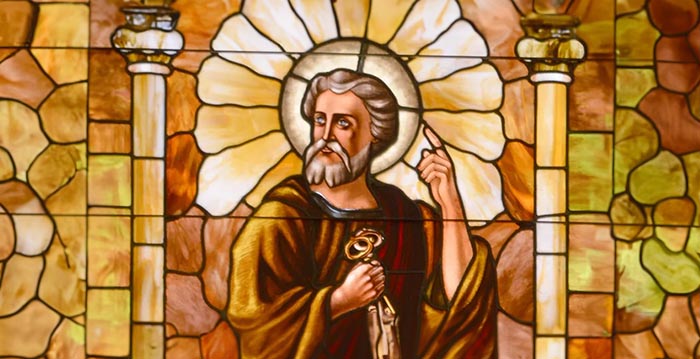
Most of our readers are well aware of the fact that certain have for centuries claimed that Peter went to Rome in A.D. 42 and remained there as head of the church till A.D. 66. Is this claim valid? Does it fit in with the Scriptures?
We do not feel that we can set any date as exact in the record, but we can come pretty close. It was not far from A.D. 37 when Paul was converted on the Damascus road. According to Gal 1:18, it was about three years after this that Paul went to visit Peter in Jerusalem. This is about the time that Herod tried to kill Peter, as recorded in Acts 12:1-7. So Peter was in Jerusalem as late as about A.D. 40.
Paul was in Jerusalem to appear before the council 14 years after his conversion. See Gal 2:1. This is the council meeting recorded in Acts 15:22. This would be about the year A.D. 51. And Peter was there, one of the council and a PILLAR, as Paul refers to some of the leaders. This would indicate that he was still a resident of Jerusalem.
Sometime before the council in Jerusalem, Peter had visited Antioch (not the Antioch in Pisidia in Asia Minor, but the one in Syria north of Damascus). See Gal 2:11.
The last record we have of Peter in the Scriptures is his first Epistle, written from Babylon, about A.D. 60. In that day, Babylon was just about as far from Rome as you could get and still be in the civilized world of that time.
None of this recorded history of Peter gives any hint that he ever even contemplated going to Rome at any time. But on the contrary, the council made the decision in A.D. 51 that Paul was to go to the uncircumcision, and the other apostles, including Peter, were to go to the circumcision. Just this decision in itself makes it very unlikely that Peter would have gone to Rome. As Paul's Epistle to the Romans indicates, the church there was largely Gentile believers. So Peter would have been out of place and unable to function as the Apostle to the circumcision.
It is further indicated that Peter did abide by the council's decision. He addressed his letters to strangers scattered abroad. These are the Jews dispersed from Jerusalem after the death of Stephen and the persecution.
Paul wrote his Epistle to the Romans about A.D. 58. At the end of the Epistle, he sends a greeting to many of the believers in Rome, but Peter is not mentioned among these. Surely, Paul would not have left Peter out if he had been there.
All that we know about the death of Peter is what we find in John's Gospel (John 21:18-19), where we are told Peter's hands will be stretched out and bound by another. This could have been crucifixion or some other violent execution as performed all over the known world. When and where this may have happened, we have not the slightest clue so far.
And neither do we know what happened to Paul. The last reference to him is his second Epistle to Timothy, which seems to be the last of his writing. He says that he is ready for his departure, which is at hand. We believe shortly after he wrote that final letter to Timothy, his son in the faith, Nero had him executed in Rome.
It is unlikely that Peter ever even saw Rome, and Paul was able to evangelize from there because he pleaded his case unto Caeser, which was his right, for he was a Roman citizen. Of course, both these wonderful, faithful servants of The Lord Jesus Christ could not be harmed until, like Paul said, "For I am now ready to be offered, and the time of my departure is at hand. I have fought a good fight, I have finished my course, I have kept the faith" (2 Timothy 4:6-8).
